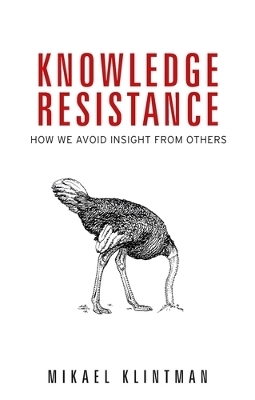
Knowledge Resistance
Manchester University Press (Verlag)
978-1-5261-3520-9 (ISBN)
Why do people and groups ignore, deny and resist knowledge about society's many problems? In a world of 'alternative facts', 'fake news’ that some believe could be remedied by ‘factfulness’, the question has never been more pressing. After years of ideologically polarised debates on this topic, the book seeks to further advance our understanding of the phenomenon of knowledge resistance by integrating insights from the social, economic and evolutionary sciences. It identifies simplistic views in public and scholarly debates about what facts, knowledge and human motivations are and what 'rational' use of information actually means. The examples used include controversies about nature-nurture, climate change, gender roles, vaccination, genetically modified food and artificial intelligence. Drawing on cutting-edge scholarship as well as personal experiences of culture clashes, the book is aimed at the general, educated public as well as students and scholars interested in the interface of human motivation and the urgent social problems of today. -- .
Mikael Klintman is Professor of Sociology at the University of Lund, Sweden, Visiting Scholar at the Centre for Philosophy of Natural and Social Science, London School of Economics and Political Science and a former Wallenberg Fellow of Environment and Sustainability at Massachusetts Institute of Technology, Cambridge, MA. -- .
1 Introduction
2 What knowledge resistance isn’t and a hint at what it is
3 If you’re with us, don't believe them
4 Why invalid claims can be valuable
5 Knowledge belief first, confirming evidence second
6 What’s in it for me to know that?
7 When knowledge is responsibility and ignorance freedom
8 What if the earth is round? Concerns about cultural consequences
9 How to resist knowledge resistance – and when
10 Is knowledge resistance always bad, and other questions
Index -- .
| Erscheinungsdatum | 23.08.2019 |
|---|---|
| Verlagsort | Manchester |
| Sprache | englisch |
| Maße | 138 x 216 mm |
| Gewicht | 490 g |
| Themenwelt | Geisteswissenschaften ► Philosophie ► Erkenntnistheorie / Wissenschaftstheorie |
| Sozialwissenschaften ► Soziologie | |
| ISBN-10 | 1-5261-3520-5 / 1526135205 |
| ISBN-13 | 978-1-5261-3520-9 / 9781526135209 |
| Zustand | Neuware |
| Haben Sie eine Frage zum Produkt? |
aus dem Bereich

![Was heißt Denken?. Vorlesung Wintersemester 1951/52. [Was bedeutet das alles?] - Martin Heidegger](/media/113619842)
